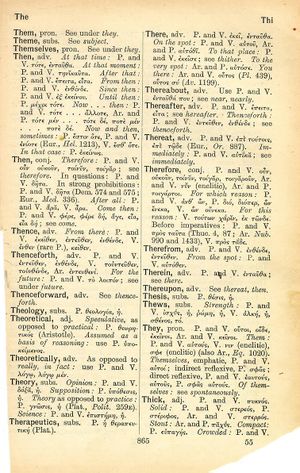then: Difference between revisions
καλῶς γέ μου τὸν υἱὸν ὦ Στιλβωνίδη εὑρὼν ἀπιόντ' ἀπὸ γυμνασίου λελουμένον οὐκ ἔκυσας, οὐ προσεῖπας, οὐ προσηγάγου, οὐκ ὠρχιπέδισας, ὢν ἐμοὶ πατρικὸς φίλος → Ah! Is this well done, Stilbonides? You met my son coming from the bath after the gymnasium and you neither spoke to him, nor kissed him, nor took him with you, nor ever once felt his balls. Would anyone call you an old friend of mine?
m (Text replacement - " . ." to "…") |
m (Woodhouse1 replacement) |
||
| Line 1: | Line 1: | ||
{{Woodhouse1 | {{Woodhouse1 | ||
|Text=[[File:woodhouse_865.jpg|thumb|link={{filepath:woodhouse_865.jpg}}]] | |Text=[[File:woodhouse_865.jpg|thumb|link={{filepath:woodhouse_865.jpg}}]] | ||
===adverb=== | |||
[[at that time]]: [[prose|P.]] and [[verse|V.]] [[τότε]], [[ἐνταῦθα]]. | |||
[[at that moment]]: [[prose|P.]] and [[verse|V.]] [[τηνικαῦτα]]. | |||
[[after that]]: [[prose|P.]] and [[verse|V.]] [[ἔπειτα]], [[εἶτα]]. | |||
[[from then]]: [[prose|P.]] and [[verse|V.]] [[ἐνθένδε]]. | |||
[[since then]]: [[prose|P.]] and [[verse|V.]] [[ἐξ ἐκείνου]]. | |||
[[until then]]: [[prose|P.]] [[μέχρι τότε]]. | |||
[[now… then]]: [[prose|P.]] and [[verse|V.]] [[τότε… ἄλλοτε]], [[Aristophanes|Ar.]] and [[prose|P.]] [[τότε μέν… τότε δέ]], [[ποτὲ μέν… ποτὲ]] δέ. | |||
[[now and then]], [[sometimes]]: [[prose|P.]] [[ἔστιν ὅτε]], [[prose|P.]] and [[verse|V.]] [[ἐνίοτε]] ([[Euripides|Eur.]], ''[[Helen]]'' 1213), [[verse|V.]] [[ἔσθ' ὅτε]]. | |||
[[in that case]]: [[prose|P.]] [[ἐκείνως]]. | |||
===conjunction=== | |||
[[therefore]]: [[prose|P.]] and [[verse|V.]] [[οὖν]], [[οὐκοῦν]], [[τοίνυν]], [[τοίγαρ]]; see [[therefore]]. | |||
[[in questions]]: [[prose|P.]] and [[verse|V.]] [[δῆτα]]. | |||
[[in strong prohibitions]]: [[prose|P.]] and [[verse|V.]] [[δῆτα]] ([[Demosthenes|Dem.]] 574 and 575; [[Euripides|Eur.]], ''[[Medea]]'' 336). | |||
[[after all]]: [[prose|P.]] and [[verse|V.]] [[ἄρα]], [[verse|V.]] [[ἆρα]]. | |||
[[come then]]: [[prose|P.]] and [[verse|V.]] [[φέρε]], [[φέρε δή]], [[ἄγε]], [[εἶα]], [[εἶα δή]]; see [[come]]. | |||
}} | }} | ||
Revision as of 08:50, 20 May 2020
English > Greek (Woodhouse)
adverb
at that time: P. and V. τότε, ἐνταῦθα.
at that moment: P. and V. τηνικαῦτα.
after that: P. and V. ἔπειτα, εἶτα.
since then: P. and V. ἐξ ἐκείνου.
now… then: P. and V. τότε… ἄλλοτε, Ar. and P. τότε μέν… τότε δέ, ποτὲ μέν… ποτὲ δέ.
now and then, sometimes: P. ἔστιν ὅτε, P. and V. ἐνίοτε (Eur., Helen 1213), V. ἔσθ' ὅτε.
conjunction
therefore: P. and V. οὖν, οὐκοῦν, τοίνυν, τοίγαρ; see therefore.
in questions: P. and V. δῆτα.
in strong prohibitions: P. and V. δῆτα (Dem. 574 and 575; Eur., Medea 336).
after all: P. and V. ἄρα, V. ἆρα.
come then: P. and V. φέρε, φέρε δή, ἄγε, εἶα, εἶα δή; see come.

